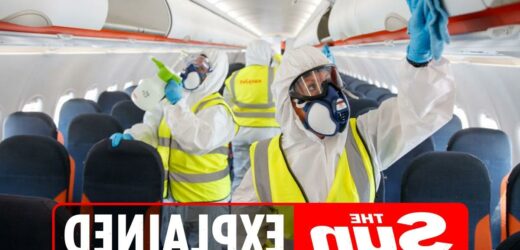SUN-starved Brits are readying their passports at they jet off abroad for holidays from May 17.
But what rules exactly do you need to follow in the airport and on the flight? Here’s all you need to know…
Where can Brits fly?
From May 17, people can go on domestic holidays with others – providing they stick to the rule of six.
A small number of countries have been added to the UK's 'green list' – meaning quarantine isn't necessary upon a return to the UK.
They include Israel, Singapore, Portugal, the Falkland Islands, Ascension, St Helena, Tristan da Cunha, Gibraltar, Faroe Islands, Iceland and Brunei.
And New Zealand and Australia are also on the list – but they have their own entry requirements and are unlikely to let in tourists at the moment.
But Boris Johnson has said he won't be adding any more destinations to the green list anytime soon as the Indian variant of Covid-19 poses "a real risk of disruption" and said he will remain cautious in the return of foreign travel.
Millions of holidaymakers were keeping their fingers crossed for Spain, Greece and France to be added in time for the summer season.
Before booking
Before booking any holidays brits should check the government’s latest information on coronavirus entry requirements and travel warnings for the country you are traveling to.
Travellers should also check what you will need to do on your return to the UK.
The government also advises you should speak to your travel insurer before you jet off.
Check in
Where possible Brits should check in online to avoid face-to-face contact at the airport.
People are being strongly encouraged to check in baggage to the aircraft hold and minimise any hand baggage.
This will speed up boarding and disembarking and minimise the risk of transmission.
Arriving at the airport
Holidaymakers arriving at the airport must follow social distancing rules in all areas.
You should enter the airport on your own, unless you are flying with members of your household.
In England, Scotland and Wales, you must wear a face covering in airports.
In Northern Ireland, it is recommended that you wear a face covering in airports.
Inside the airport
Brits should avoid touching surfaces in the airport and wash their hands after touching frequently touched surfaces like luggage trolleys.
Depending on the airport you fly from and where you are flying to, you may need to have your temperature checked before flying.
The government advises people to avoid walking around the airport and mixing with people you do not normally meet.
In shops at the airport, wear a face covering, follow social distancing measures and, where possible, pay by contactless card.
What are the rules on the plane?
Each airline will advise passengers on measures in place for your flight.
Facemasks
In England, Scotland and Wales, passengers must wear a face covering onboard aircraft.
In Northern Ireland, it is recommended that passengers wear face coverings onboard aircraft.
Facemask may only be removed on the flight to:
- communicate with someone who relies on lip reading
- avoid harm or injury
- take medication
- eat or drink, if reasonably necessary
Food and drink
During the flight, passengers remain seated as much as possible and follow instructions and guidance from crew.
Flights will only be operating a reduced food and drink service to minimise contact with the crew.
Symptoms
It is very important to alert cabin crew if you start feeling ill while on the flight.
Passenger locator forms
Anyone arriving into the UK must complete a passenger locator form and provide your contact and journey details.
When you arrive at check in at the airport, at the UK border you’ll need to show this form.
Negative test
To travel to the UK, even if you’re a citizen, you must have proof of a negative coronavirus test.
You must have proof of a negative COVID-19 test to travel to the UK – even if you’re a UK citizen.
If your test result is positive you must not travel.
The test must be taken in the 3 days before you depart.
You’ll need to show the test results when you check in to travel or board your plane.
Brits may also be asked to show them when they arrive into the country.
Source: Read Full Article





